#i used to hate modern literature but its quite good in certain cases
Explore tagged Tumblr posts
Text
Not to be that person, but I took a class on modern American literature, and Malevolent hits a ton of the major themes despite not being modern (though taking place during the modern era). Themes of atheism and extensialism? Of monstrosity vs. humanity, and where does one draw the line? Of morality?
#honestly#i used to hate modern literature but its quite good in certain cases#this is probably nerdy af sory#malevolent#slut.txt
9 notes
·
View notes
Note
Hi Kay!
I just wanted to take a moment and say how deeply moving (and overall comforting) I find your writing to be! I've gone through almost the entirety of your masterlist twice in the past month alone and have found myself returning more often to the pieces of literature/poems your reference sometimes. (Especially that one poem by Benedict Smith! I've read a few more by him because of you and they're just wonderfully lovely 💛 so I'm eternally thankful to you for including it.)
I may be wrong in assuming, but I believe you may have studied/are currently studying a degree involving literature. I hope this isn't too foreward of me but I was wandering if you have any other works of literature that you'd recommend? (I'd love to read anything you recommend from poems to plays 💛) I'm slightly embaressed to say but the works I've read are quite limited to a highschool level and since I'm currently studying Pharmacy, there are very few people who can recommend me such moving works. :)
I also feel like I should apologise for writing such a large ask, so please accept this apology as well hehe 💕🥺
Sincerely,
Bek 🌻
Hey there Bek ���💕✨
First of all... I'm incredibly sorry for how long it took me to reply to this ask, I know you sent it weeks ago and I'm honestly just ashamed of myself for only replying now! I've been taking a bit of a Tumblr break again, or rather a break from literally everything, and I guess not having written anything in a while made me feel guilty whenever I opened Tumblr, so... All I can say for myself really is that I'm sorry you had to wait so long! Again, I never ever ignore anyone, I promise! It just sometimes takes a while for me to reply 😅🙈
Now, I'm so happy to hear that you've been enjoying my writing! 🥺🥰 Hearing that it's comforting and inspiring to you is honestly such a relief and indeed does make me happy more than I can say 💚 It's so cool that you're checking up on all the references I make aaahhh 🥺🥺🥺 I love it 😁 You're always more than welcome, love! I don't think I could stop including references to literature, culture, history and the science around it even if I tried 😅☺️
And yeah, I did study classics and newer literature as a minor for my undergrad degree 😄 But tbh I still work with literally a lot even now (I'm in grad school for media and cultural studies) even though it's technically not something I've been properly taught ☺️ I'm just a nerd who likes to learn on her own, and with media and culture you can pretty much delve into almost anything you want 😂😅🤷🏻♀️
Now, it's not forward at all to ask me for literature recommendations! 😁😃 I truly love recommending stuff!!! I have a few up my sleeve, even though you've probably heard of a few already, for obvious reasons: A lot of what I truly enjoyed reading was something Tom Hiddleston has worked on in one way or another! It's truly a magnificent guideline for picking new literature... Just look up the literary origins of his films/shows/plays and you will be in for quality literature most of the time! I don't think I've ever mentioned it on here, but me reading High-Rise (JG Ballard) because I heard Tom would be partaking in the film adaptation was actually what sparked my love and passion for literature!!! Yep, it's that good. Now on to the recommendations though 😁(This... got rather long):
Plays
Anything by Harold Pinter really, but for obvious reasons you'll find a lot of additionally fun stuff for Betrayal, which is lovely and truly funny if you're in on the kind of humour btw
Medea by Euripides (a classic, but I love it nonetheless... You can find translations in almost every language) ((and pls stay away from Seneca's Medea, because ugh... Euripides is far better AND the og story, as much as anyone can say that for Greek mythology)
La Bohème by Puccini (I know, this is technically an opera, but if you read the libretto it's honestly just like a play... And if you're up for it, the og story is in prose and written by Henri Murger... It's better than the opera, but oftentimes more difficult to find) ((this one is hilarious and basically explains an entire cultural subgroup in the 19th century)
Faust by Goethe (many people hate it, but I LOVE this one!!! It's also been translated into any and every language, and it's so interesting philosophically!!! It's also referenced SO freaking often literally everywhere, and the operas and ballets based on it are always my fave) ((there's technically Faust I and Faust II, but you're good to go just reading the first one)
Anything by Shakespeare, obviously... Though I do love me my Hamlet like every other literature enthusiast (Yes, I can do that one famous soliloquy in act 3 scene 1 by heart as well...)
Poetry
Again, anything Shakespeare for the win, but I LOVE the sonnets and keep a copy of them with me most of the time (Yes, I own multiple copies of the sonnets...) ((My faves are 116 and 91, but there's always so much truth to be found in there!!!))
A lot of the stuff William Blake wrote is amazing, though you have to pick carefully with him if certain religious motives aren't your thing... I love The Tyger, which is an individual poem, and the collection of works called Tyger, Tyger which does have many good ones and a few ones that are a little more on the mediocre side
Do not go gentle into that good night by Dylan Thomas (I know this one by heart as well... It's beautiful, and there's a version of Hiddleston reading it on YouTube, which gives you even more goosebumps than the poem does anyway)
Invictus by William Ernest Henley (same for this one, also read by the one and only) ((I love to read this when I'm feeling down or powerless))
The Love Song of J. Alfred Prufrock by T. S. Eliot (This is another wow piece with many quotable lines and truths... I love it a lot and keep coming back to it! It's also a great example of how literary modernism tried to condense the complexity and passing of time and history into a single frame that had to be intrinsically poetical in nature... As in, this poem could've been a short story in any other period, but modernists loved to make everything a poem so here you go)
Der Zauberlehrling by Goethe (This one sucks in all English translations I’ve found, poetically speaking, but in German it’s such a fun piece! If you’ve ever seen the Disney ‘The Sorcerer’s Apprentice’ with Mickey Mouse or listened to the orchestral piece by Paul Dukas, then this poem proves very useful in truly understanding either! But again, the English translation should only be taken for informational value... The German one is also worded hilariously)
Prose
Short edited by Alan Ziegler (This is a collection of short prose forms that honestly is a must for me... I love this book to pieces and have had it for years now! It’s an international anthology, so you’ll find more and less famous authors from all around the world represented with short stories, prose poems, short essays and just curious and interesting snippets of writing! I draw a lot of inspiration from this book)
High-Rise by JG Ballard (As mentioned above, I owe this book part of my personality... I don’t think I would be the same person without having read it. It’s not necessarily full of wisdom, but if you’re interested in a different kind of portrayal of the human condition, then this is the read you need to take a look at)
The City of Dreaming Books by Walter Moers (This is another piece that changed my perception of literature, even though this is a more ordinary and ‘fun’-value read... It’s one of my favourite books and it’s endlessly entertaining! So if the classics are a bit heavy for you, this one is perfect for casual readers as well! Its value really does lie more in the realisation of how fun literature can be, and the freedom you have as an author... So really, I could recommend everything by Moers, his style is amazing both in the German original and in the English translation. Yes, I’ve read both.)
Good Omens by Neil Gaiman and Terry Pratchett (This is comedic gold, stylistic gold and generally a bloody perfect book. Also a ‘fun’-value read, but it also does a magnificent job at showing you what you can do with literature, and how well-developed characters are supposed to be written)
The Penguin Book of the Undead (Penguin Classics) edited by Scott G. Bruce (This book is basically an education on fifteen hundred years of supernatural encounters and how culture wrote, used and perceived them. You get introductory texts for different periods and social groups, explaining how and why ghost stories were written and used, followed by passages of the prime source texts (eg. ancient necromancy shown on The Odyssey). Really, this book is just for cultural history nerds)
The Earthquake in Chile by Kleist (This isn’t necessarily one of my faves, but it has helped me understand what studying literature and culture can do for you. In case anyone remembers my insistence in Wicked Game that you gotta know what a pomegranate symbolises... this novella is such an instance where this knowledge would prove useful. Generally, it gives many opportunities to think about privilege and circumstance)
The Symposium by Plato (You’ll probably not want to read the entire collection of speeches tbh... But the concepts introduced mainly here and in some of Plato’s other work are well worth looking into! For example, the ‘double being’ introduces a concept that in modern fiction is called soulmates... Just sayin’)
31 notes
·
View notes
Text
Anonymous asked: Have you watched Lupin? What did you think? (And are you a fan of the books or other adaptations of the character?)
The short answer is yes, I have seen Lupin on Netflix. Overall I enjoyed it so long as I suspended my disbelief at certain things.
Unfortunately it took being struck down by Covid and being bedridden for me to actually to binge watch the whole series. So I was behind the curve when my friends, French and those outside of France, started to talk about it around me. I had to beg them not to give away spoilers until I had seen it all.
It did surprise me that it won rave widespread reviews outside France because usually French drama series don’t travel very well outside of France. I’m sure even Netflix had no idea how successful it would be for them. I’m sure being in Covid lockdown had something to do with it. In any case I don’t begrudge its success as it’s well earned.
However I wasn’t too surprised that within France itself the French reviews were decidely mixed and divisive. The critic at Le Point painfully hit the nail on the head when he wrote, “Le plus gros défaut de l'ensemble reste la pauvreté des personnages, tous unidimensionnels, caricaturaux et aussi épais que du papier à cigarette.“ - loosely translated as, ‘the biggest flaw of the whole thing remains the poverty of the characters, all one-dimensional, cartoonish and as thick as cigarette paper’.
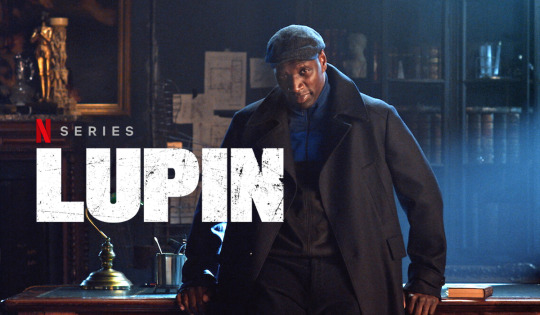
There’s a growing amount of good French stuff on TV and streaming services but a non-French audience will not have had the chance to have seen all of it yet. I can think of any number of French television drama/dramedy/cmedy series that are much better than Lupin with better plots, characters, and even a truer perspective of French society and even modern day France (Dix pour cent (Call My Agent!), Le Bureau des Légendes, Engrenages, Baron Noir, and Paris Police 1900). But you would be hard pressed to find anything that comes close to Lupin just for the sake of something fun to watch during the Covid lockdown.
What makes the current generation of home made French television series so interesting is how much of it is a reflection of France’s own anxieities about itself and its role in a increasingly English speaking dominating world. In a funny way it sees itself as defiant plucky Asterix fighting off the Roman American cultural hordes from totally invading their Francophone culture.
For sure, it has societal and racial issues stemming from its colonial legacy and issues of immigration and integration (France has the largest Muslim population in Europe). However it seems to want to ‘resolve’ these issues through the almost sacramental adherence to French secularist ideals rather than American inspired ideas of social justice and equity. There’s always been something very admirable about the French - from the time of General de Gaulle and perhaps before - always swinging from snooty ambivalence to outright antipathy towards the influence of American culture ‘americanising’ French culture (no to Walmarts or fast food chains for example).
Is it any wonder then that Netflix’s ill-conceived American series ‘Emily in Paris’ was widely hated and mocked within France for just perpetuating those lazy American tropes of Paris and French culture?
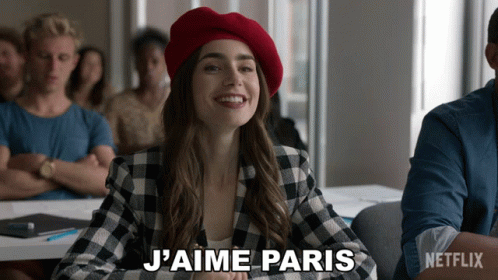
Personally I know Francophile Americans, long resident in Paris, who were frankly embarrassed and spent a lot of time apologising to their French friends. I have one American friend who has told me that she was so mad that she would have blind folded Emily and shoved her hard in the car boot and drive her all the way to the poorest of the banlieues in the grimey crime saturated suburbs of Paris - Seine-Saint-Denis came to mind - and dump her preening arse there. She would slap her and tell the spoilt entitied brat to make her own way back home - you know, to her spacious apartment in one of the most expensive arrondissements of Paris that of course(!) any American intern working for French marketing firms can afford.
I digress. My apologies. Watching this God awful show gives me PTSD.
Onto Lupin.
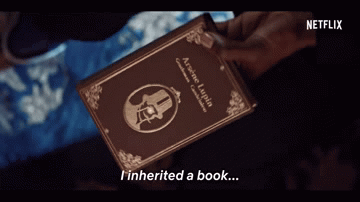
Thankfully Lupin doesn’t try to play to non-French tropes of what Paris is or isn’t. It does skim the surface of current discontents within French culture and society (race, class, power, and money) but ever so lightly so as to not get in the way of just spinning a good crowd pleasing yarn. It invites you to have fun and not to think too much. I have to be honest and say I enjoyed it as long as I suspended my disbelief here and there.
Lupin refers of course to the character Arsène Lupin, the French gentleman thief who stole jewellery from Parisian haute bourgeois and aristocracy at the turn of the century. Lupin, as written in the novels and short stories by Maurice Leblanc between 1905 and his death in 1941, was the archetypical anti-hero, a Robin Hood who stole from those who deserved it but kept the loot himself. He was often portrayed often a force for good, while operating on the wrong side of the law.
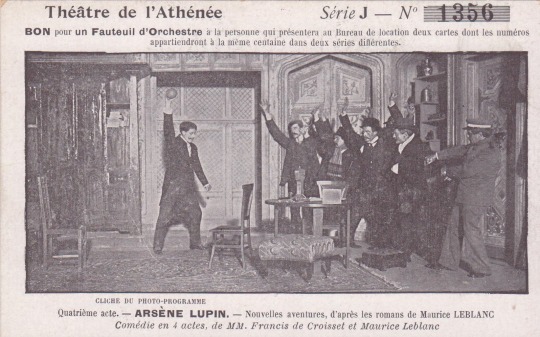
Lupin never really made much of an impact outside of France as he had within France where is revered with many French film and television adaptations. In England, we already had a Lupin type character in the form of A.J. Raffles, a cricket playing gentleman thief with his aristocratic side kick, Bunny. E.W. Horning’s stories of Raffles’ daring heists proved to be quite popular with the British public when Raffles first appeared on the scene in 1898. And even later Leslie Charteris’ The Saint took over the mantle from Raffles as the gentleman thief/adventuring Robin Hood.
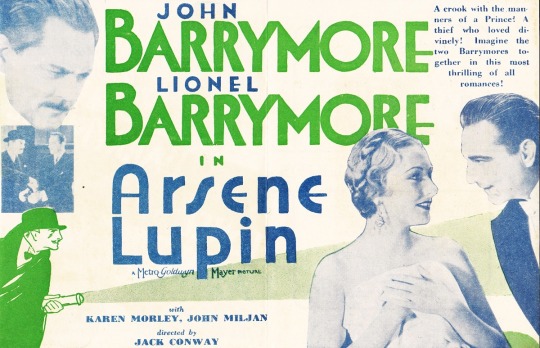
I think Hollywood tried to introduce him to an English speaking audience (legendary actor John Barrymore even played him) but he didn’t really take off and eventually they found their gentleman thief archetype in Sir Charles Lytton aka The Phantom (played by David Niven and Christopher Plummer) in the Pink Panther movies. So Lupin never got the English audience he deserved.
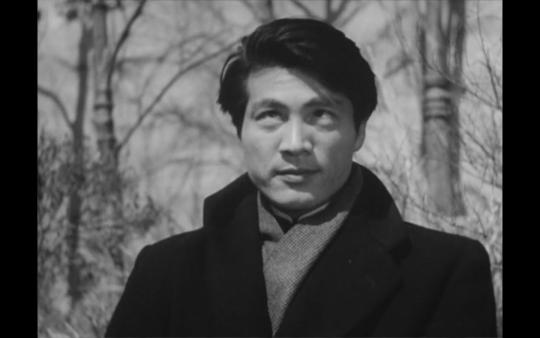
I first got wind of who Arsène Lupin was when I was growing up in Japan as a child. As strange as it sounds Lupin was big in Japan especially after World War Two. The Japanese did their own take on the Lupin character using Japanese actors and plot lines but it was Lupin.
I don’t know how exactly but I remember watching these scratchy DVDs of these Lupin inspired films. I think it was one of my parents’ Japanese friends who was mad for all things Lupin and he had studied French literature in France. Jogging my memory I now recall these black & white films were done in the 1950s. One starred Keiji Sada and the other version I remember was with Eija Okada (he was in Resnais’ classic film, Hiroshima Mon Amour) as Arsene Lupin called (I think) Kao-no Nai Otoko. I didn’t understand most of it at the time because it was all in Japanese and my Japanese (at the time) was pitiful, but it looked fun.
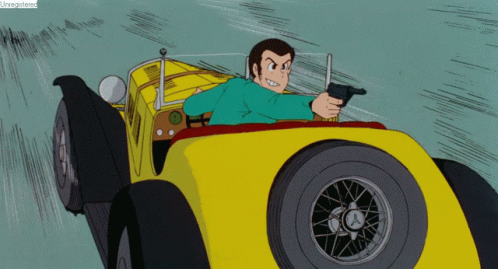
There was even a Japanese manga version of Lupin which was called Lupin III, - so named because he was the grandson of the real Arsène Lupin.
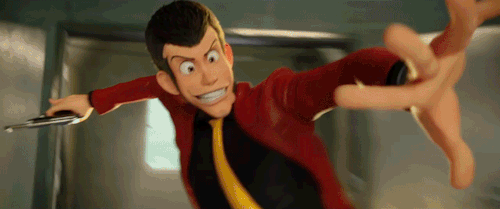
The 1960s manga series spawned generations of TV series which I do remember watching and finding it terribly exciting if somewhat confusing.
It was French expatriate friends whom my family knew that introduced me to the real Arsène Lupin. They had a few of the books authored by Maurice Leblanc. It was in French so I read them to improve my French but enjoyed the story along the way.
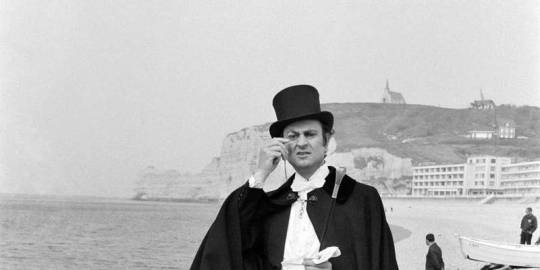
I also remember them showing me scratchy episodes of the 1970s Franco-German TV series ‘Arsène Lupin’ with the monocle wearing Georges Descrières in the lead role. It was a classical re-telling of the adventures of the aristocratic gentleman-burglar and very family friendly viewing. I don’t really remember much of it to be honest.
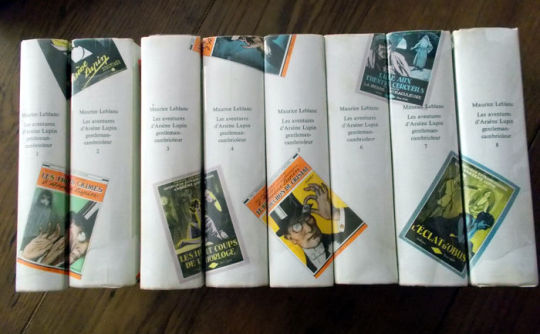
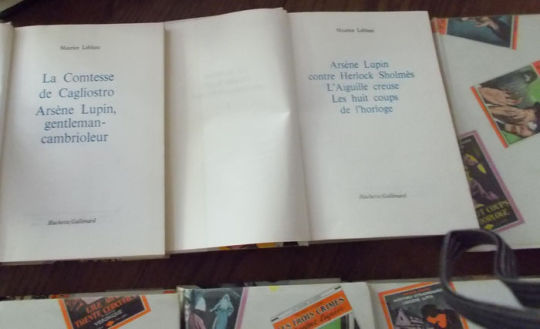
It was some years before I actually started to read more of the Maurice Leblanc’s novels and short stories collection. I have them all now. I was a teen and I remember being stuck in a snowed in a Swiss Alpine chalet and with nothing else to do but pull out a few dog eared books from the bookshelves belonging to our French host and read to pass the time.
I read Les Dents du tigre, Arsène Lupin vs Herlock Sholmes, and Les Huit Coups de l'horloge and thoroughly enjoyed them in the original French. I was already reading classic detective and mystery novels (Sherlock Holmes, Poirot etc) so it was natural to read the adventures of Arsène Lupin.
I haven’t got around to reading all the novels and short stories but I have read most of them and I enjoyed them all immensely. In the same way Conan Doyle, through Holmes and Watson, manages to conjure a convincing picture of late Victorian and early Edwardian England, so Leblanc manages to give us a taste of Belle Epoque France through the eyes of his suave gentleman-thief, Arsène Lupin.
Indeed it's a lot like reading Sherlock Holmes in that you're always trying to figure out how he did it, but the difference is that you are rooting for the bad guy. You can’t help but be drawn to this gentleman thief who is charming, comic, playful, and romantic and generous. Lupin is not an intellectual puzzle-solver but first a master criminal, later a detective helper, who maintains his curious ethics throughout his adventures. In this regard he is very much the anti-Sherlock Holmes; and I wasn’t disappointed when I actually read the story where Lupin faces off with Holmes himself. Brilliant!
I’ve also seen the 2004 French movie with Romain Duris in the Lupin lead role and it also starred the majestic Kristin Scott Thomas and the sexy Eva Green.
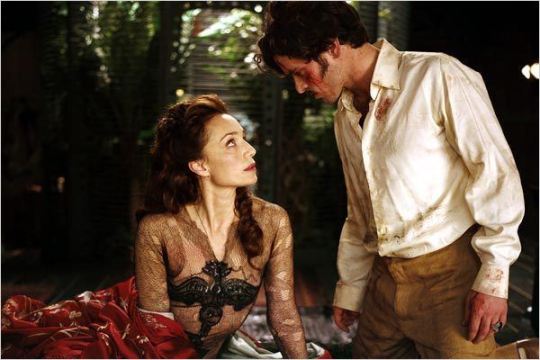
It was a decent adventure flick and it was a clear confluence of different Lupin novels (The Queen's Necklace (introducing Lupin's childhood), The Hollow Needle (where the treasure is the macguffin of the story), The Arrest of Arsène Lupin (the gala on the ship as a backdrop) and Josephine Balsamo, (one of Lupin’s most memorable opponents in the The Countess Of Cagliostro).
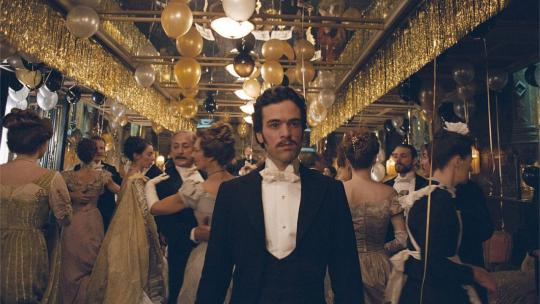
Romaine Duris, a fine classical actor, was I felt miscast because he didn’t have Lupin’s levity of wit and be at ease within himself. I love Duris in his other films but in Arsène Lupin and even in his other film, Moliere, he seemed ill at ease with the role. Perhaps that’s just me.
The latest Netflix adaptation (or reimagining to be more precise) is a welcome addition to the world of Arsène Lupin.If you don’t over-think it, it’s bags of fun.
Omar Sy is immensely likeable. Sy is a deservedly a big star in France - he won the best actor César for “The Intouchables,” an international hit - and has played forgettable secondary characters in big-budget American special effects movies (he was Chris Pratt’s assistant in “Jurassic World” and a minor mutant in “X-Men: Days of Future Past”). It was reportedly his desire to play Arsène Lupin, whom he’s compared to James Bond (“fun, funny, elegant”), that led to the series, created by British writer George Kay. And it is on his charm that the series largely, though not entirely, rests.
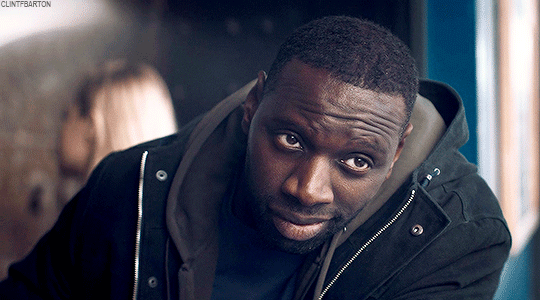
So the basic story revolves around a jewellery heist. Sy plays Assane Diop, a first-generation French-Senegalese man in contemporary Paris. A collection of Lupin stories, a gift from his father - whose undeserved fate Assane set himself to avenge in long-delayed, Count of Monte Cristo style upon a criminal tycoon - has made the actual Lupin books a foundation of his life and profitably illicit career. This fan-ship goes as far as borrowing practical ideas from the stories and constructing aliases out of anagrams of “Arsene Lupin,” a habit that will attract the interest of a low-level police detective (Soufiane Guerrab as Youssef Guedira) who shares Assane’s love of the books. (That the detective also shares an initial with Lupin’s own adversary, Inspector Ganimard, is possibly not a coincidence.)
Among the many comic delights of Lupin, is an unspoken one. Time and again, the show’s hero, master thief Assane Diop is able to slip into a place unnoticed, or by assuming a minor disguise that prevents witnesses from providing an accurate description of him to law enforcement.
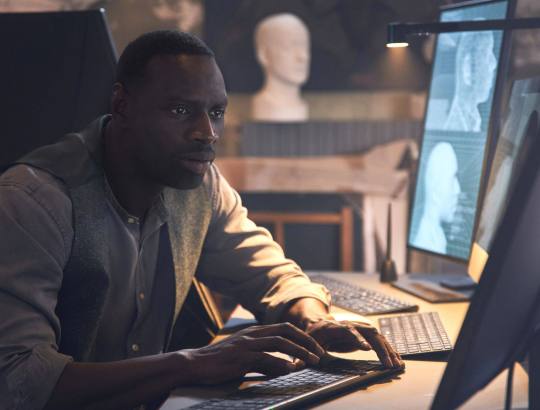
Why is this funny?
Because Omar Sy is six feet three (and, since most actors are short, seems even taller), is roughly as wide as soccer pitch, and is memorable even before he flashes his infectious million-Euro smile. This is not a man for whom anonymity should be possible - even allowing for racial bias in a majority-white country, Assane would be memorable and distinctive - and Lupin seems cheekily aware of this. Like the various incredible sleights of hand Assane deploys to pull off his thefts and escapes, his ability to be anyone, anywhere, is treated more as a superpower than as something even the world’s greatest criminal would be able to pull off.
At one point, when he’s slated for a cable news appearance as a much older man, we learn that Assane is also a master of disguise. The revelation of this skill arrives with a wink in the show, and it feels pointless to ask where he learned it, or how he affords movie-quality latex and makeup. Or rather, asking the question feels wrong.
We know this is impossible, the show seems to be asking its viewers again and again, but isn’t it so much fun?
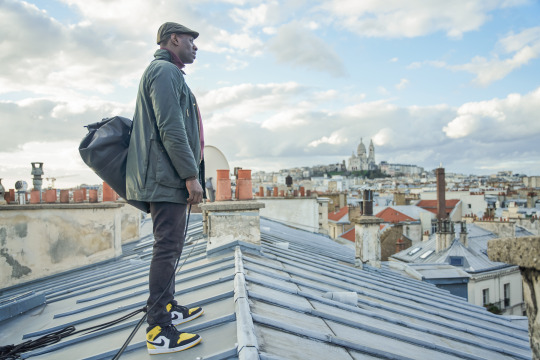
The performances and the production - it has that particularly European filmic quality of feeling natural even when it gets stylish - keep the series warm even as the plot is made up of incredulous contraptions that require everything to go right at just the right time and for human psychology to be 100% predictable. Its physics are classical rather than quantum, one might say, and like the world itself, which becomes more curious the deeper you peer into things, it is best handled along the surface. You do not want to take too much time working out the likelihood of any of this happening. Just go along for the ride.
Somehow, though, it all works because Sy is so magnetic and charming that questioning plot logic feels wildly besides the point. Though he never looks appreciably different in his various aliases (including one ill-conceived live-TV appearance done under old-man makeup and a thick beard), he changes his posture and voice ( if you watch it in French that is) enough to allow for the willing suspension of disbelief, in the same way that any lead actor as Superman has to do when playing Clark Kent. But Sy and the show are at their strongest when Assane is just being his own Superman self, utterly relaxed and confident in his own skin, and so captivating that his ex-partner, Claire, can’t really resist him despite ample reason to.
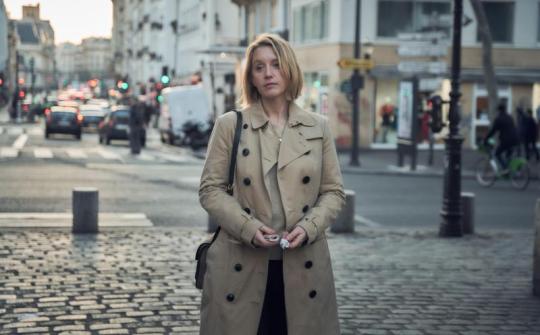
If Assane seems practically perfect in every way, he is not perfectly perfect. His most obvious failing is that his criminal shenanigans and revenging make him less than reliable in his daily life, affecting his relationships with ex-partner Claire (Ludivine Sagnier, whom non-French audiences might recognise from “The Young Pope” and “The New Pope”), who despairs of his inability to show up on time to see his son Raoul (Etan Simon). Like Sy, Sagnier brings a lot of soul to her part - though onscreen far less, she’s as important as Sy to the series’ success - and the two actors have great chemistry. Also impressive and key to creating sympathy are the actors who play their flashback teenage selves, Mamadou Haidara and Ludmilla Makowski. Really, you could do away with action elements and build a series around them.
This is a pity because Lupin often fumbles its emotional reveals in other parts - the story of Diop being torn between his job and his family feels like wheel-spinning, rather than genuine emotional intrigue.

Soufiane Guerrab is wasted in the Young Detective Consumed by the Case role and spends most of this season pinning colour printouts of book covers to cork boards and getting waved off by his colleagues, who are all blinded or otherwise hampered by careerism.
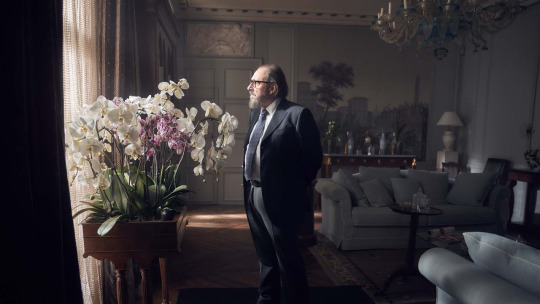
But to my mind the weakest link is the villain himself and his daughter. Veteran actor Hervé Pierre hams it up as Hubert Pellegrini, a business tycoon who is the patriarch of the Pellegrini family. He just comes across as animated cartoon villain with no character depth (think moustache twirling Russian villain, Boris Badenov, in the Rocky & Bullwinkle cartoon shows). He just emotes anger a lot without any nuance or hint of complexity.
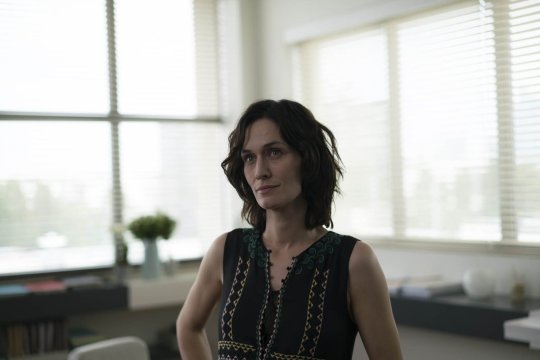
Even Clotilde Hesme who plays the daughter who is unaware of her father’s criminal tendencies is miscast. For the record I adore Clotilde Hesme as she one of France’s most talented classical actresses (that non-French outsiders will not have heard of). She is a classically theatre trained actress and is one of the best stage actresses of her generation that I have ever seen. I’ve seen her in plays where she is just mesmerising. She has said before that she’s more comfortable on the stage than she is on the screen. And when she has been on screen she still has been a powerful presence. She’s actually won a César too. Here in Lupin, she seems to have no agency and looks bored with nothing really to do.I really hope they give her more scenes in the next part of Lupin.
The series is at its best when following Diop enacting his plans, and when revealing each one from a different vantage, making us privy to every moving part like a magician revealing his secrets. The show captures the momentum of a clockwork heist, the tension of sudden obstacles and the ingenuity of improvised responses, with thrilling precision (especially in “Chapter 1 - Le Collier de la reine,” directed by Now You See Me’s Louis Leterrier).
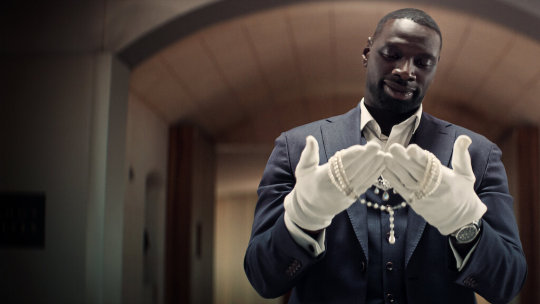
Lupin is also politically incisive when it wants to be; it brings to mind Ladj Ly’s Oscar-nominated 2019 film Les Misérables, which adapted the broad strokes of Victor Hugo’s novel about the 1832 Paris Rebellion, and modernised the story by focusing on the police brutality faced by non-white Parisians.
Lupin opens with Diop disguised as cleaning staff and entering the Louvre after-hours, alongside dozens of forgotten, anonymous non-white workers as they pass by “La Liberté guidant le people,” Eugène Delacroix’s famous painting of the July Revolution of 1830 which replaced France’s hereditary rule with popular sovereignty.
Before any semblance of plot or character, Lupin centres broken ideals and promises unkept (without giving too much away, the show’s primary villain has much more nationalistic view of French culture and history which merely adds to a cartoonish caricature than a complex character). The rest of the episode is about valuable jewels once owned by Marie Antionette - one of the most recognisable symbols of wealth and extravagance in times of extreme poverty - which are put up for auction by the Pelligrini family, and bid on by other wealthy collectors with bottomless purses and no sense of irony.
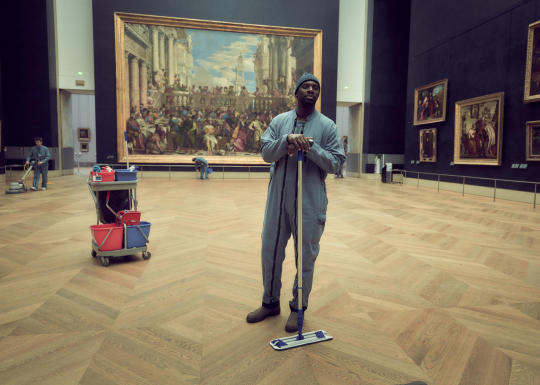
Granted, beyond this auction subplot, explorations of race and class are largely limited to individual interactions, but the show continues to refer back to (and implicitly comment on) its source material in ways that wink at the audience. An elderly, unassuming target of Diop’s schemes seems like an unlikely victim at first - Diop, though he acts in his own self-interest, usually displays a moral compass - until this victim reveals the colonial origins of her wealth, immediately re-contextualising the ethics of the situation, in a manner that Leblanc’s stories did not. (The show is yet to apply this lens to Arsène Lupin himself, who Diop treats with reverence, but that’s a secondary concern since Lupin is entirely fictional in-world).
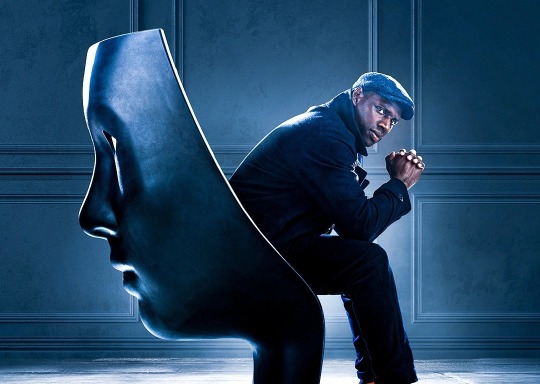
Barring some nagging structural problems - like cutting to flashbacks when things are getting exciting, or epilogues that feel ten minutes too long - Lupin mostly works. It plants a few personal seeds early on, which it keeps hinting at without fully addressing, but by the time its scattered elements come into focus, the show finally figures out how to weave them together, and delivers a mid-season cliffhanger that renders many of these flaws irrelevant.
Lupin manages to have fun even with an antiquated premise - the story of a suave con-man who charms his way through high-profile robberies - while adding just enough new spin on the concept to feel refreshing. Omar Sy may not have much to work with, but his alluring presence makes Assane Diop feel like a worthy successor to Arsène Lupin.
Lupin isn’t going to win César, BAFTA, or Emmy awards, or even turn heads for its ability to develop tertiary or even secondary plots or characters - that doesn’t really matter. You’re there to see a difficult hero be difficult and heroic - everyone else is there to be charmed, vexed, or eluded by them. Sy’s performance bounds off the screen, and is almost musical. He floats through scenes like he glides over the roofs and through the back alleys of Paris; he outmanoeuvres his foes with superior literary references and sheer athleticism. He is irresistible and also good at everything he tries, even kidnapping.
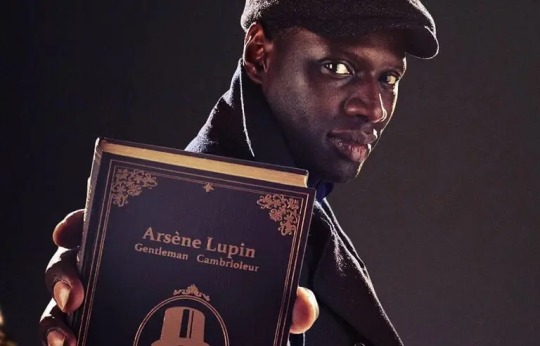
I would encourage anyone to watch Lupin for a fun care free ride. But the only caveat I would make is watch it in the original French.
If you don’t know French then put on the subtitles to understand (that’s what they are there for). The real crime is to watch this (or any film or television series) dubbed in a foreign language. It’s disrespectful to the actors and film makers and it’s silly because it’s comical to watch something dubbed over.
Please watch it in the original French.
Then go and read the books. You won’t regret it.
Thanks for your question.
#question#ask#lupin#omar sy#netflix#tv show#culture#personal#arsene lupin#japan#maurice leblanc#france#french#society#arts
48 notes
·
View notes
Text
IS CENSORSHIP THE DEATH OF CONTENT CREATIVITY?
Censorship, unquestionably, is not just a deterrent to an individual's expression of creativity, but in fact, the very curtailment of their freedom. Since ages past, Censorship has been a tool utilized by ruling bodies, be it kings, queens, priests, religions, or in the present case, democratic governments, to curb expressions of dissent either by an individual or communities. Although an ancient tool, it is still quite popular and in wide use by modern governments worldwide, granted its severity differs from nation to nation. However, foremost, presenting facts: Censorship is always a product of the essentially dominant zeitgeist, which is without exception defined by the ruling social class (more often than not conservative), which wants to maintain the status quo of a specific region. Censorship is no new subject, and to better understand, we have to study both the present and the past. Even today, this is an issue that will undoubtedly affect our country's future.
Let us first state the precise definition of Censorship: "Censorship is the suppression of speech, public communication, or other information, on the basis that such material is considered objectionable, harmful, sensitive, or "inconvenient." Censorship can be conducted by governments, private institutions, and other controlling bodies.” This is a standard definition of Censorship. However, what people fail to realize is that Censorship's scope spans far and wide beyond the scope of just entertainment and news media. Not to mention the methodology of implementing censorships.
Nevertheless, how about we first trace the history of Censorship up to the present date. The first, most famous instance of Censorship is known to have happened in ancient Greece, where the great philosopher Socrates was charged with "corrupting" the youths and was henceforth executed. ‘Censorship by death’ might seem a thing of the past but is still very much a part of the present world. Censorship keeps reappearing as a blot in the history of humankind, as a sinister spectre. We remember the brutal killings by the church in the 16th century against the progress of science, the mass Censorship of literature in the 17th century by James I, the bloody Censorship in the 18th century during the Reign of Terror, not to mention the censorships implemented by Great Britain when India began its freedom struggle. Even in recent times, Censorship is an ever-looming presence. It was only 40 years ago when Indira Gandhi had implemented the emergency curtailing any and all criticism against the Government. Unfortunately, it is no revelation that India is right now going through a phase where a new kind of Censorship might emerge. A Censorship where there will not be a need to suppress the truth since the truth itself might stop existing hidden under the dirty disguise of propaganda and the veil of patriotism. This Censorship is the courtesy of ******** **** belonging to *** party.
From the examples, it can be easily surmised that no single incident exists where Censorship as a practice led to a positive result. More often than not, Censorship has been a product of conservative social practices and orthodox morality. It is always geared towards thwarting the path of progress. In maintaining the status quo. Several justifications are given in favour of Censorship. All valid reasons in themselves, but the rampant misuse made by the privileged few seriously casts a shadow of doubt on the systemic of Censorship. As previously mentioned, Censorship is subject to a conservative morality, and furthermore, a tool by the Government. These two forces combined only work to hinder the freedom of speech of the average citizens. Severe direct criticism against the ruling body or the upper class is not taken kindly. The so-called 'sentiments' being hurt belong only to the Savarna Heteronormative world, when they feel an 'attack'. But when it comes to the straight-up unconstitutional portrayal and slurs against the Queer and economically depressed classes, our democratic system invariably fails at protecting their constitutional rights.
Censorship is beyond a doubt the bane of content creativity. The combination of the psychological aspect and malignancy of censorship further create sinister dynamics worth our study. In an environment riddled with Censorships, there is psychologically established a safe zone and a danger zone in the individual's mind, creating an isolation of ideas and further constriction of mind. For fear of physical and mental harm, the user/creator remains within the arbitrarily made safe zone, created and defined by those in power. Once the zones are psychologically established, they start taking social roots. The safe zone creepily and silently becomes the core of social values. Hence, in essence, Censorship, in proxy with social values, becomes unquestionable. This further extends the safe zone in the social environment. Stepping out of that safe zone results in facing the wrath of the society itself. It, of course, is an obvious fact that societal norms are ingrained in an individual since infancy and hence get rooted inside the mind. Again, gaining a psychological aspect and here we witness the vicious circle of isolating the information and categorizing it as right or wrong, not through any critical judgment but simply because it becomes a predefined entity by an arbitrary authority (The ruling body). A fixed societal system then leads to a stale system of information where nothing new or creative can exist; rather, nothing new or creative is allowed to exist.
Additionally, Censorship is not merely an act of banning or removing certain content or proliferation of specific ideas. It is a sheer exercise in redacting the truth and hiding it behind a veneer of lies. Just like creativity can be expressed in multitudes of ways beyond the limited scope of media, similarly there exist nuanced censorship practices aimed at crushing deviant and creative modes of thinking. Censorships aimed at creating only one designated path. The different types of Censorship are: Censoring certain content (Removal), spreading false information to overshadow facts (Misleading), capturing means of information (Hijacking), Destabilising communications (Isolation of areas), Interference in collecting data, active prevention of expressing of one's views (Banning protests), ignoring or refusing to acknowledge specific outlets of expression (Disregarding), the threat of harm to relatives or the personnel themselves, and in the most extreme case Censorship by Death. With the coming of the digital age, the act of Censorship has become far more nuanced and harder to detect. And while the people keep struggling to find new ways of expressing their creativity\ the hounds of censorship keep up the chase. The freedom of the Internet is like a double-edged sword. Finding accurate facts among the propaganda and Whatsapp forwards is like trying to find a needle in the haystack. Perhaps part of the issue lies with the overload of information that has become possible with the Internet culture of our time.
Without a doubt, all the blame and critical talk surrounding Censorship should fall on the Government, regardless of the party. The Government's responsibility is to listen to the people's voices, not dictate that voice. A common argument in favour of Censorship is that Government is trying to protect the people from harmful, negative or disturbing media and discouraging its promotion. Media such as child pornography, disturbing and traumatizing videos of murder and gore, texts which might not be suitable for specific age groups. Fair enough. But my question is, why doesn't the Government try to eradicate the problems themselves? How is it that no action against the crime itself is taken? The very existence of such media is proof of how miserably our Government is failing.
Moreover, when someone raises these issues explicitly, those people are silenced on the grounds of spreading 'disturbing' content. Media handles spreading hate violence against communities, and misogynist content are allowed to do what they want willy-nilly, but porn websites are like the ultimate taboo, Oh! What a ruin of 'Indian values’. The ‘disturbing’ content which so endangers our peace and freedom is nothing more than the artist holding a mirror to the society. The artistic freedom exists in the fact that the artist can hold the mirror in any angle to show the dirty side-lines which nourish our established societal foundations. Censorship only exists to break those mirrors. It is an inability to confront the rotten reality, to face the cost of maintain the status quo. We are concerned about the children seeing the scars on a woman’s naked body; Mind! We are not concerned about the scars but about the nakedness! But why ashamed now, when you so proudly beat her up in front of your own child? We are concerned about an abuse in a TV show; Mind! We don’t care about the abuse, but about the fact that it is being hurled at our shining, virtuous culture! But why worried now when the abuses you threw on the young Dalit boy, are being thrown back on you? His are the abuses which are probably the fairest.
An interesting incident comes to my mind, which will also serve as a nice metaphor. Back in February, one of our glorious leaders invited a foreign leader for a political visit. They were supposed to tour certain parts of the country, to show its beauty. In preparation, we made walls along the roads! For very good reasons surely, and not to hide the dirt and the poverty lining the streets. So, the tour continued and our leaders travelled our beautiful country through those clean, immaculate, and wonderful roads, lined with walls on either side. I think the name of the walls was ‘Censorship’. And so it is, that we kill and wall off creativity and the truth. Because the fact is there is no one truth. The diversity and the creativity are all their own forms of truth. All those paths exist for us to explore and learn. But censorship allows only one road. The clean one. Which only the virtuous, the rich and the clean can walk.
Baudrillard's insight into the creation of reality is incredibly useful and a much-recommended read. His much-acclaimed theory has been, how in the present age of information explosion, the one who controls the flow of information is the one who controls reality. We have already witnessed how dangerous Censorship can be during Stalin's reign, where around 80000 people simply vanished. A similar pattern can be seen today with mob lynching and murders of journalists and reporters who dare to raise their voice against fascism. The riots, the protests, the beatings and the killings are the signs of our time. Hence it is not just the threat of ‘Death of creativity’ that we face, but it is almost a matter of life and death. Only us, the people can stand against it and openly raise our voices by our Freedom of expression and speech. The question remains: When will we come together to fight it?
By- Aditya Singh
2 notes
·
View notes
Text
Secret Garden
I know, I know, it's an assignment book, but I will still include it in my reading log, and I do this because while reading this I had all sorts of questions. So let us dive into our small Q&A session
Q.#1 Why does the author dislike Mary so much?!
It is not really hard to figure out that the author hates Mary at least at the beginning. This poor girl has ALL the qualities to be disliked and even hated by the reader. Almost at the beginning of the book, we get a pretty explicit description of Mary:
So when she was a sickly, fretful, ugly little baby she was kept out of the way, and when she became a sickly, fretful, toddling thing she was kept out of the way also. [1, p. 2]
It seems like the author doesn't miss any chance he gets to accentuate how ugly and disgusting she is in every way possible. She has no manners, she hits people, she waits for everybody to do everything for her and doesn't even think to say please or thank you. Nobody really likes her, and the author seems to coerce the reader to despise her, but I rejected that position. Why do I have to hate the poor girls, who got half-raised by Indian servants and never truly belonged to anybody? Why do I have to hate Mary for her lack of obedience and manners if she has never been taught how to behave?
I don't think I have an answer, although there is an assumption. The book was written in 1911, and at that time, the didactic influence on children's literature remained relatively strong. Deborah Stevenson, in her article "History of Children's and Young Adult Literature" states:
Didacticism remains a strong element of contemporary children's books ostensibly designed for pleasure.[2, p. 180]
So there we have it, Mary is designed to be disgusting at the beginning of the book because children who do not behave cannot be good. They have to take a spiritual journey, understand how to be a good member of society, stop being disagreeable. Only then they can be worthy of pleasing adjectives.
Interestingly enough, Marina Nikolajeva in her article “Did you Feel as if you Hated People?” states, that Mary is depicted in that way, because the author doesn’t want readers to relate to characters, to merge with their personality.
The “just-like-me” assessment of characters, frequently adopted by novice readers, is restricted by the readers’ experience and does not foster empathy [3, p. 101]
Nevertheless, the author admits that most of Marry's problems are a consequence of the complete absence of her family:
If she had been an affectionate child, who had been used to being loved, she would have broken her heart, but even though she was "Mistress Mary Quite Contrary" she was desolate, and the bright-breasted little bird brought a look into her sour little face which was almost a smile. [1, p. 23]
In this context, the word "desolate" caught my attention. Having looked at the Online Cambridge Dictionary, I discovered the meaning - "extremely sad and feeling alone".
So Mary is not "ugly", she is not "quite contrary", not "fretful". She is just desolate and unjustly deprived of the basic human need - the need of a family, the need for being loved and cared for.
Q.#2 Is Colin really different from Marry?
Well, no.
That would be the simple answer and the most evident one, as the author tells us more than once, that Colin and Marry are equal in how horribly they behave towards other people. Nevertheless, while reading, I couldn't help but notice how different author makes us feel about them.
Colin, who is another unfortunate child without a proper family, never gets to be called something as ugly or fretful. He is shown to be pretty egoistic, but from the author's perspective, it doesn't look like he needs to go on a spiritual journey to become "a good child". Moreover, not only once is he described as a beautiful boy, even though he often has tantrums and never goes outside.
He was a very proud boy. He lay thinking for a while, and then Mary saw his beautiful smile begin and gradually change his whole face. [1, p.129]
Now, maybe he is portrayed like that because most of the time, we see the world from Marry's perspective, and she evidently fancies him. That is why, despite him being a "brat", he has a beautiful appearance.
Q.#3 Is the book really racist?
Well, yes.
Although, that answer, just like the previous one, would be the shallow one. Let us dig deeper.
As I already mentioned, we see the world from Marry’s perspective, except only for two last chapters, where we see robin’s and Mr Craven points of view. She is the one who encountered Indian people, and she is ultimately the only source of information about India that all the other characters possess. So, being a spoiled little girl as she is, is it any wonder that she talks about Indian servants in such a humiliating way? I bet she would speak like that about any person who served her, no matter the race or nationality. There was also an interesting dialogue between Martha and Marry:
“Eh! I can see it’s different,” she answered almost sympathetically. “I dare say it’s because there’s such a lot o’ blacks there instead o’ respectable white people. When I heard you was comin’ from India I thought you was a black too.”
Mary sat up in bed furious.
“What!” she said. “What! You thought I was a native. You—you daughter of a pig!”
Martha stared and looked hot.
“Who are you callin’ names?” she said. “You needn’t be so vexed. That’s not th’ way for a young lady to talk. I’ve nothin’ against th’ blacks. When you read about ’em in tracts they’re always very religious. You always read as a black’s a man an’ a brother. I’ve never seen a black an’ I was fair pleased to think I was goin’ to see one close. [1, p. 15]
From this passage, we can see that Martha has nothing against black people. In fact, the notion of “respectable white people” comes out of her lack of proper education and the absence of intercultural communication.
In the world 21st century, it is tough to say something without enraging certain people. I dare say, the silencing imposed on the Internet speech came to the point, that you are afraid to state your opinion without being condemned (Twitter campaign with hashtags RIPJKRowling as the most recent example).
The same thing applies to the books such as Secret Garden that cannot fit into modern cannon. Should we ban them? Where is the line between book propagandising the racism and the book that has racist characters in? Should we simply deny the existence of such people? And if yes, wouldn’t this denial be more dangerous than just putting the reality of the world out there for children to see? How do we insert that kind of people into a book and at the same time show that what they say isn’t quite right?
These questions are not part of our Q&A session, because, sadly, I don’t have the answer. I doubt that anyone does.
Q.#4 Why would author put that Yorkshire accent in the text?
That is a question that I asked myself pretty frequently. Actually, I wondered about it every time I struggled to read and understand it... so, every two pages more or less.
When I first encountered it, I instantly remember the books of Stephen King. In almost every one of his books, some people speak a southern American accent, making it hard to understand them. Reading those books, I didn’t bother wondering, what was the point of that kind of speech. Still, in the case of Secret Garden, the answer came to me quite quickly - it is actually a great author’s linguistic attempt to make the reader feel like Marry.
She comes to a place totally different from what she knew all her life, and even though people speak her language, she still struggles to understand them. It definitely helped me to relate to Mary, because, let me tell you, the Scottish accent is not an easy one to understand! So, I felt (and still sometimes feel) very awkward keeping asking people to repeat what they just said, just like Marry.
Q.#5 Is “The Secret Garden” anti-feminist?
It is not that hard to see, that "The Secret Garden", although started as an Entwicklungsroman, where the main character is supposed to develop and mentally mature, suddenly lost its point. The focus just shifted to Colin, and Mary was not even at the end of the story, discarded as a redundant character. While it may be seen so, there is an interesting article by Linda Parsons "' Otherways' into the Garden Re-visioning the Feminine in the Secret Garden" [4] where she argues that this novel is feminist in its core. Therefore, the author points out the fluidity of the gender depicted in the book. She gives an example of Ben Weatherstaff and Dickson, who are both caring and close to nature, something that is considered to be feminine qualities.
Also, she argues that the shift of the focus from Marry to Colin is justified. From her perspective, the author's intent to show that Collin is expelled from the Garden. Therefore, it is still Marry's story, because she matured and grew as a person, while Colin, even though healed physically, couldn't reach her emotional level, so he has no place in the Garden. I accept her interpretation, although I would point out, that I can't entirely agree with her last statement "I rejoice that Mary remains forever in the garden" [4, p. 267]. The fairytale-like endings that include nouns such as forever cannot be perceived as positive. The characters should evolve, both mentally and physically, but staying in one place forever would prevent Mary from doing that.
So at first, it was tough to understand Martha and Dickson, but with time it became more comfortable for Marry as well as for me. She even started speaking in Yorkshire sometimes, and that is a way of the author to show us one of the small but significant changes in Marry. Not only she becomes more kind towards other people, she genuinely wants to learn how to speak their language. Even Colin starts to master it, I guess, this skill he acquires after his magic ritual.
Interestingly enough, in the retold version, characters don’t speak Yorkshire anymore. I think although it makes it easier for children to read it, the book itself loses a valuable lesson of acceptance of other cultures and the assimilation. I would even argue that it’s one of the most important ones, as in our age of globalisation being acceptant of different cultures is a vital skill.
___
References:
1. Frances Hodgson Burnett “The Secret Garden”, The Project Gutenberg, accessed on: 07 Oct 2020: http://www.gutenberg.org/files/113/113-h/113-h.htm
2. Deborah Stevenson. 19 Oct 2010, History of Children’s and Young Adult Literature from: Handbook of Research on Children’s and Young Adult Literature Routledge, accessed on: 12 Oct 2020: https://www.routledgehandbooks.com/doi/10.4324/9780203843543.ch13
3. Maria Nikolajeva (2013) “Did you Feel as if you Hated People?”: Emotional Literacy Through Fiction, New Review of Children's Literature and Librarianship, 95-107 pp.
4. Linda Parsons “’Otherways’ into the Garden Re-visioning the Feminine in the Secret Garden”, Children’s Literature in Education, Vol. 33, No. 4, December 2002, 247-268 pp.
0 notes
Text
Angel on the Underground - Chapter 2
My train journey was now marked not just by stops along the line, but by the blur of graffiti I passed shortly before arriving at London Bridge Station. Or perhaps the blur of a graffito, since it appeared to be just the one image drawn on the tunnel wall.
I got a reasonably decent view of the blur each morning and afternoon. Obviously not a good enough view to know what it was a picture of, but certainly good enough that I knew it was a roughly child-sized, greyish spray-painting. It seemed to be a picture of someone, and I wondered if it was some musician, writer or activist who had inspired the graffito artist. The train was slowing as the blur rushed by, and it was the daily reminder that it was twenty to nine and I was approaching the platform.
My walk to the office on Angel Place was the usual squash of hundreds of busy people rushing to work. They were mostly exhausted and fed-up commuters in sweaty shirts on their way to one of the countless offices around London Bridge. I even recognised one or two of them as being employed by fellow charities, people I'd seen at functions and co-operative fundraisers. There was always an oddball or two, though, and I could barely think of a journey around London that didn't involve meeting some strange person with an inexplicable appearance.
Today it was a man dressed as an angel. Not a half-hearted attempt either; a full white robe with large wings to the side of him. It was a wonder he could make it on the underground. They weren't exactly outstretched, but in a swung-back, or rather swung-down, position. They were easily one-person wide each, meaning the angel took up three people's places wherever he walked or stood. It was a highly inconvenient outfit, made all the more inconvenient by a large, brass ring suspended by a rod above his head. The angel wasn't the traditional, pure-white figure as depicted in Renaissance art, but more a grubby twist on the classic, with even the cloak an off-white hue and the wings being closer to those of a wood pigeon than an olive-bearing dove.
I couldn't quite fathom why this man (it appeared to be a man, although I couldn't be certain) was dressed in such a way. He certainly was confident enough to go out that way, unless the costume was forming a shield around a more insecure individual. Perhaps it was part of campaigning for some charity located in the area.
In the office and on the phone again, I had to deal with another day of depressing calls. It wasn't that I didn't value the work. Of course I knew of and cared about the problems that people were dealing with. Every fibre of my being is compassionate and concerned about abuse. But that was just the problem. Not that I was ignorant but that I was too well aware. It was grating, wearing, deteriorating my own mental wellbeing.
‘Good morning, you're through to Reduce Abuse. You're speaking to Robert. How may I help you?’
‘Hi Robert, I'm… I don't really want to say my name.’
‘That's okay. I'm just here to talk if you need someone. You can say as much or as little as you like.’
‘Thank you, Robert.’ The callers liked to use a name. Reduce Abuse insisted upon having us use a name, even if it's not your real name. It's something personal to cling to. A comfort. ‘I... I was raped.’
It was surprising how open people were about this, but it was often the case. People went from never telling anyone in their lives what had happened to confessing all to a stranger over the phone. Anonymity could be a blessing and a curse. Here at Reduce Abuse we tried to use it for good.
‘I'm very sorry to hear that,’ I said sincerely. ‘Is this something that happened to you recently?’
‘No… No, it happened… It happened around 25 years ago. I've never told anyone.’ Her voice started breaking. ‘I've never told anyone.’
‘That's okay. I'm here with you now.’
‘Thank you. Thank you so much. I just needed someone to talk to.’
Or sometimes they would go like this:
‘Good morning, you're through to Reduce Abuse. You're speaking to Robert. How may I help you?’
‘I don't understand. I don't get it. What's the point of it? What's the point of anything?’
I could hear that the person on the other end of the phone was shaking, on the verge of tears.
‘It's okay. I'm here to talk.’
‘Thank you. Can you help me?’
‘I’ll do what I can.’
‘Thank you. How do you do it, Robert? How do you get out of bed each morning and convince yourself there are reasons to be alive?’
‘Well, I personally try to focus on the positives. This morning I had a couple of croissants in some nice honey.’ This was a lie. I stuffed a slice of toast into my mouth on the way to get the tube. ‘It made me happy, and it might not solve everything in the long-term, but does everything need to?’
‘Are croissants going to provide you meaning in a meaningless world? Is your breakfast going to stave off your inevitable death?’
‘Of course not. But that made me happy this morning. Now I'm having a chat with you and tonight I'll watch something interesting on TV. None of these things are solving the fundamental questions of the universe, but they bring us pleasure in the short term. They make us happy without making anyone unhappy, and can hardly be described as reckless behaviour.’
‘That makes you happy. It doesn't make me happy.’
‘What does make you happy? Are you an avid reader, or a painter, or a bike-rider?’
‘I'm sort of into exercise. I'll go for a run occasionally, but I'm not hugely committed. Hate cycling. I like reading.’
‘Who's your favourite author?’
‘That's a tricky one. I really like Fitzgerald.’
‘F. Scott or Zelda,’ I asked, with a grin that I hoped could be detected over the phone.
‘Ah,’ he said, more positively, ‘you know your stuff.’
‘I've read Save Me the Waltz as well as most of Scott's stuff.’
‘Have you read Nancy Mitford's biography of Zelda?’
‘No, I haven't, although I've heard good things.’
‘It's very good, if anything a little too good.’ He was clearly cheering up now. ‘It made me hate Scott Fitzgerald,’ he mumbled glumly. Perhaps he wasn’t cheering up as much as I'd thought.
‘Why do you say that?’
‘Because he was a cheating, controlling scumbag who possibly stole from his wife's writing, and definitely encouraged her to give up on writing future novels. She once threw herself down the stairs to get his attention because he was neglecting her and flirting with someone else at a party.’
I didn't know what to say to that. I grasped for something, and decided it was best to continue the conversation as normal, rather than leave dead air and have him draw his own conclusions. ‘Sounds like quite a wild but toxic relationship.’
‘Yeah, exactly. I don't really feel comfortable reading the books of a writer like that.’
‘So do you believe it's impossible to separate the art from the artist?’
‘Well, yeah. I mean how can we listen to what he has to say about the world if his actions made someone's world an unbearable place? He may have drunk himself to death, but he led his wife into an early grave with him.’
It was a valid point, and one I wasn't sure I had it in me to refute. However, this was bothering the caller, and it was my duty to make him feel better. If I told him that his misery was justified and indisputable, then I was doing nothing to help improve his condition. ‘What do you think of the Leavises?’
‘Who?’
‘Q. D. and F. R. Leavis. They were two literary critics, arguably the founders of modern English Literature as a subject, who believed that everything relevant to a novel is contained within its pages.’
‘So all the biographical details of an author are irrelevant to the work?’
‘Exactly right.’
‘So we just ignore who the individual is? Even if you're reading a book by a rapist or a murderer, it doesn't weigh on your conscience?’
‘That's what the Leavises say.’ What was I doing? I'm not a Leavisite.
‘And how about all the contemporary artists? People who are still making works of art and profiting from it? What about all the directors and actors whose movies are still making hundreds of millions? Even if they're sex offenders or violent thugs, we should just ignore that, should we?’
‘Well, it's still possible to separate art from an artist.'
'So I can go and see a film directed by a rapist, knowing that my money is going to the rapist in question?'
'Well, the majority goes to the studio.'
'And the studio makes money, so they keep hiring the same director, still putting him in a position where he can hire actors and actresses and assault them without any comeuppance.'
It was a difficult case. I tried my best to debate without telling the caller definitively whether he was right or wrong. What was I doing? This wasn't my job, and I wasn't a trained psychiatrist. I was on the phone most of the day now, even though I'd been hired to deal specifically with cyber-bullying.
While I was talking, I noticed the rest of the office (with the exception of my manager, who had a room of his own just behind me) giving a round of applause. I looked up and saw that my colleagues were all looking at me and grinning; upon turning, I noticed I was gripping an orange, which made me laugh.
My colleagues discovered long ago that I was good at catching. 'Phenomenal' they largely agreed. I don't know why, I guess I just did a lot of sport as a teenager and got very good at throwing and catching. I was trained up at this, so during the quieter periods in the office, when we had no messages to respond to, emails to answer or calls to take, we would take it in turns to throw and catch a ball around the office. I was so good at this, that it became a case of people throwing various items at me to see if In could catch them. I never failed once.
Now it was common for people to throw things at me when I wasn't looking to see if they could catch me out. Again, my ability was so good that I never failed. Here I was, holding an orange which had been thrown at me, and my reactions were so good I didn't even realise I'd reached out to catch it.
'How do you do that?' one of the people shouted from the other end of the office, at which point I indicated to show that I was talking to someone on the phone. Even my boss was stood behind me cheering me on, which caused the person on the other end of my line who was currently crying about the loss of a loved one to ask why they could hear such festivities.
When my call was done, my boss said, ‘Sounded like another cracking job well done.’
That was one of the frustrating things about him. He viewed every element of our work as a mere algorithm: say the right words and phrases and soon enough the caller will be fixed. It was never that simple. It never could be. The honest truth was that some of our callers were people who just needed someone to talk to in a time of struggle or if they had something to get off their chest, but a lot of these people needed serious counselling.
‘Why am I always the one on the phone?’
‘What?’
‘It always ends up being me taking the phone calls.’
‘Yes, but you’re good at it.’
‘I’m meant to be on social media. Responding to messages and comments. I like that. Being able to take a moment to think as I reply. I’m better at writing than I am at speaking.’
He let out a small, airy laugh at this, which I tried to ignore. It was frustrating. Such a subtle noise, yet it could be interpreted many ways. Most people reserved that short sound for a case of injustice or a mildly amusing joke which deserved appreciation without summoning genuine laughter. Here he’d forced it to come out with no evident cause. It made me irrationally angry, but it felt so belittling. I tried my best to ignore it and continue, but I got the sense that a scowl was spreading its way across my forehead.
‘I don’t like being on the phone. It feels like I’m being put on the spot.’
At that moment, Simon lobbed his mug across from the other end of the office and I caught it. ‘Two sugars if you wouldn’t mind, Rob.’
I got up and went to the small, dirty kitchen which contained only a kettle, a broken fridge and a few boxes of teabags. We had expressed concern about the poor quality and limited cleanliness of the place before, but the response had invariably been bossman pulling a smug, patronising smile and saying, ‘But we are supplying you with free hot drinks.’ It was hardly a speedboat, but I think the expectation was that we ought to be grateful.
Nobody ever had a rebuttal to that. Any time anything went wrong, we were expected to either put up or fix it ourselves, at our own expense. It was a charity, after all, and every penny spent on a new fridge was a penny taken away from raising awareness, supporting those in need and fighting important legal battles. Anyone who suggested anything to management which might involve a potential unnecessary expense went bright red at the thought, feeling very guilty about taking money from a charity. I happened to know that a few people working in management were on six-figure wages, but the less said about it the better.
Boss gathered a couple more mugs and followed me into the kitchen. We’d gotten so used to referring to him by his role that many people in the office were probably unaware what his actual name was. It was tedious at first, but when we realised that the disgusting power trip he got from being called Boss also brought his guard down, we knew we could call him that and he’d be like putty in our hands. He still refused most of his employers’ requests, but Boss was the best hope we had of getting in his good books.
'I was just a little confused, Boss, about why I'm on the phones so often.'
His face dropped. 'Is it an issue that you're on the phone a lot?'
'Well, it's not really in my job description.'
'Would you like me to update your job description?'
'That's not really my point. Boss.'
'Look, Robert, you're really good at talking to people. They find it a comfort. I've listened back to some of your calls and you really help people.'
I was aware all our calls were recorded, but I never really thought about how closely they're monitored. 'I really love dealing with cyber-bullying. Obviously, it's not a fun topic, but I can deal with it, Boss. I feel like I'm helping people, without having to talk them down from the ledge every day.'
'Well, if we don't have you on the phones, we'll have to stick someone else on it. And nobody else is as good as you. Do you want someone else who is less effective to deal with those who need the best?'
I hated him doing that. It was flattery combined with blackmail. I didn't want to be on the phones. I didn't want to deal with people who were suicidal, just those who were depressed or anxious. But now he made me feel guilty. It was taking a toll on my mental health.
'Look, the people we get on the phones don't need a bit of assistance from a charity. They need regular counselling.'
Boss sighed. 'I know they do. Loads of people do. But the government decided on a policy of austerity, and now counselling is very hard to come by.’
Counselling in this country has never been easy to come by. Most counsellors work office hours, so if your office doesn’t have its own counsellor, you have to choose between taking time off work unpaid to go to a counsellor once a week (the loss of money and/or holiday time being very bad for mental health) or not going to a counsellor. Most people picked the latter, which was also bad for your mental health.
In all honest, most offices seemed to splash out endless supplies of money when they decided they were in need of a new Assistant Supervisor to the HR Consideration and Assessment Panel of Hypothetical H-ing and R-ing, but the seconded somebody raised the notion of hiring a counsellor, management claimed there was no conceivable way they could find the money for such a trivial thing.
In response to Boss’s comment, I didn’t have a reply. His point was completely valid, but so was mine. These people did need counsellors. The fact that the government had removed most funding for counselling and other health services didn’t mean an unqualified charity worker such as myself was a thorough substitute for professional counselling. I would have jokingly suggested the best thing for people’s mental health would be to vote for a different party, but it wouldn’t have been well received. Charities are legally required to be apolitical.
I didn’t quite understand how that was possible. If you’re a charity devoted to saving badgers and the government introduces a new policy of killing badgers, are you supposed to take a backseat? Or do you have to break protocol and subsequently lose charity status and the tax-exemption which comes with it? Paying more taxes for an organisation means less money to spend saving badgers, planets or mentally ill people anyway.
‘I think a lot of people need counselling more than they think,’ I said. ‘But in the absence of professional, state-funded counselling services, I suppose we’re the next best thing,’ I conceded.
Boss grinned, viewing this as a personal win. He slid a mug adorned with pictures of cats to me across the counter, apparently under the impression this was him lending me a hand. If I were a less polite person, I would have told him to make Freida’s coffee himself. He’d get it wrong, though. He doesn’t know how Freida takes it. And he likely doesn’t know that the mug covered with cats was Freida’s. She’d worked here for 15 years and her desk had supported 15 successive cat calendars, but that was clearly of no consequence to him.
#writing#novel#satire#counselling#mental health#fiction#office#ya novel#novelist#novellist#story#prose#comedy#weird#alternative
0 notes
Text
[HM] The Ramblings of an Inept Alcoholic
I was always destined to be an alcoholic. My father drank, his brothers drank, and their father too: and when he lost the ability to swallow, he drank through an IV. He was a good drinker.
I was never sure if my mother was an alcoholic. She was the sort who just slumped in her chair and watched the telly. But she did that when she was sobre, if she ever was sobre, for all I knew she was perpetually inebriated: a far better position to be than in a perpetual state of level. I hesitate to contemplate such a thing. I do not think my father would have married her if such was the case. On second thought he most probably would have. From the lack of cohesion they share, it is reasonable to suppose that the wedding happened quite by accident, and that the whole exchange had been a mishap, that some other woman had been designated as my fathers wife, and that through a haze of drunk delirium, they had much to the misfortune of all, ended up together. To this day I believe that my father won her, or the woman she had replaced, in some drinking game.
My father is quite a drinker. Whether there is pride in my voice when I say this is up to further analysis. Pride is a thing that I have been taught to value only when it is there; and given that I lived my first, however many years, without it, I have quite forgotten its consistency. I recognize it in others, quite often: it is rather belittling. He always was a good drinker. Born to it. From the age of three he had learnt to swim, finding himself in vats of wine. First flask aged four, preferred it to my grandmothers tits: he says that it was less concentrated, less fiery down the gullet.
He was the sort of drinker, whose stories needed no exageration. This isn’t to say that there was no exaggeration, that were the case people’ld think him a lightweight. You have to be tall you see: every man, woman, child knows that your tales must be at minimum twice magnified: it shows discipline. See when he told of winning a town wide drinking contest, there was no lie told. So what does he do? He fabricates the elephant; his main contestant. A large one too. As he’d tell it: big as any building, and bigger still, greater than any tree of the forest, king of all elephants, it’s trunk larger than his wife: which was a trying task for any elephant: and involved a certain lack of proportion, but I garnered that my father’s knowledge of elephants stopped at its ability to drink.
My father was always supportive of me. I resented him for it. He would nod at me: a greeting that said “How do you do? Are you well?” He’d crack open a beer for me once or twice, perhaps by accident, but deeds over words as they say. And I hated him for it. His father beat him. His grandfather beat his father. And I was left, shame of the family, alone and unbeaten.
I suppose with the retrospect a clear mind can provide, that the blame lay on me. That I chose not to suck from my mother’s tit, that I chose not to earn my father’s belt. Born without nerves, into a world no longer tumultuous, into an era with nothing to protest. No oppressor, no pressure, no point to prove. I was given everything, and for that I received nothing.
Eight, the age at which I first tried drink. Brown, and smelling of disease. Pinched my nose and poured a small dosage down the back of my throat. I noticed two things, that it tasted as it smelled, and that I was about to die. I had taken far too large a dose, and there were no ice cubes to dilute it; and my throat was on fire, and I was going to asphyxiate. When I threw it up, my throat was burnt twice. Caught, red faced, so to speak, my father laughed. It was cheap. Neither his smile nor his eyes held disappointment, and I hated him for it. I didn’t touch the stuff again, until the age of twelve.
Smoking started, age ten. Even at that age I knew sobriety to be shameful. And I was teased at every interval by my uncles and their friends. The same ever repeating lines, a result of some alcohol induced brain damage, perhaps early onset dementia. I later strived to replicate such things. I never liked to smoke: it was an expense, it smelled bad, and I knew it to cause ulcerations of the stomach. But it hid the lack of alcohol on my breath, and that in itself was enough.
There were no kids my age, and by that I mean that there were two. One, a product of incest: so I was told, and so I believed; and had certain difficulties, but it may well have been foetal alcohol syndrome: and so I took a disliking to him. The other was female and fat, and that’s all I ever knew of her: Pregnant Penny her nickname. Our teacher, a television and the front cover of a graffitied textbook. Behind the desk and in a state of mellow high, a convicted sex offender. A fact, and the only words he ever spoke to us. I suppose that we were a disappointment. And in later years, when pubescent Penny made her attempt at seduction, she was returned to her seat with the raise of two eyebrows.
At twelve I discovered the older kids. And in return for cigarettes, I was allowed to remain, and to laugh at their jokes, which were implied to be humoristic. Their class was large, with five, and so I went unnoticed. Their teacher, a divorcee, slumped lifeless and dead. And through them I learnt much of the world. And I first tried beer, a bitter brown, resemblant of piss. It went down easy, but went up just as easy. There was neither disappointment nor disdain in their eyes. To support them, and to support myself, I found a job.
Too few people read for a paper route. The pub, a family business. The coffee shop, distasteful of my manners. And the church did not pay. It was in the rundown library that I found employment. The pay was poor, but the work paltry. A one person job, stretched to two, as to not stretch one's legs. The owner much resembled her cat, slumped at the checkout, her eyes beady, whiskers not so much as a twitch. The cat of course, was stuffed. I stacked, and stood, such that nothing was stolen. On occasion, my advice was sought, and with no experience of such things, the recognition of my opinion that is, I would simply recommend the most nuanced titles. Whether they were in search of classical literature, a light read, or a comic, a short walk to the pornographic section would ensure returning customers. From this too, I learnt much of the world. As with tobacco, you grow accustomed to the aroma. And when a man with round glasses, or a woman with a wrapped shawl, crossed our entrance, we would be shutting for lunch; and when they returned an hour later, we would be shutting for the day. On a Wednesday afternoon, a couple of years later, I would go in to find her dead at her desk. A coronary apparently. Two hours it took to notice, and only then from a build up in flatulence.
It was that same year in which my father caught me skipping class. At the park sharing a pack, brown paper bottle in hand, hearing of the excavation of a second cousin from Wisconsin in Canada. And out of a bush, a prickled bush, with thorns like knives, he emerged: distinguished in dishelvery. It took several seconds for his eyes to adjust, several more for surroundings, several more still to observe my presence, and several more that I was his son. Faint and faded smile, and he was gone. The last time that I hung with the older kids.
Sixteen and faced with a decision, uncertain of expectations, I buckled under the pressure and remained in education. Fueled by an alcoholic bulimia, I sought professional aid. And through the writings of Hemingway and S. Thompson, found a certain peace. Only for it to be blown away with the setting sun. Life polarized to the neon saturates and the drab muddy monochrome. Like any opiate, addiction was to happen in several well defined stages. And in recovery there were recurring thoughts of ending it: myself and the pain that came with unrequiting aspirations. All of this and more, quickly forgot in encountering Becky. A sightly slap to the face, overshadowed by its all too physical manifestation. She was the kind of abuse I had yearned for. Young love I supposed. All things come to an end, this too I supposed, witnessing her take a long and shafted suppository, in the school parking lot. Aged eighteen school ended, an unceremonious affair. On Monday it was there, and Tuesday it wasn’t. No one seemed to notice, no one cared. An ashen debris, with arson suspected. And I left for the city.
I became a writer, for they knew how to drink, to smoke, to revel in the ravellings of their own ineptitude. And I did just that, though drinking limited. Insomnia came and went, its passing a side effect of the caffeine and sedatives. I became a writer and did not write: my take on modern literature. My time occupying itself with music and movies, and I learnt that taste was subjective, pubs and clubs and bathroom stalls, with women most often whiskeyed. And then there came a time, when my card was declined, and there became need for a real occupation. And so, two weeks into the life of a writer, I found myself an accountant, with expectations, responsibilities, a thin black tie and a station of free coffee. The money was good, and I became a whore to the constitutional stability. It was only as I mused over the monthly and annual gym membership rates, that my subliminal sufferings became sentient.
The doctors offered sanctuary. A place to list my concerns: that I was twenty and recycling, that I listened to pop music, that this winter I was to ski in Aspen, and that I ate fair-trade, free-range, organic. And he listened, eyes sagged, and asked what I wanted. I responded ‘to drink, to be depressed, to have direction’. And I was given a prescription of sugar pills, and told to get married. A liver transplant, simply would not have been enough.
It was while in pursuit of a wife, that my mother passed. Mistook the highway for the couch. No funeral, no coffin, no cremation, a hole in a field. And sat atop her, I wandered whether pissing or weeping was more appropriate. I supposed it unprecedented. And in any case, my bladder was barren, and there were no onions at hand.
My uncles at forty, were put in a home. Their minds bent and broken, unable to recall which twin they were, unable to finish their own sentences. All culminating in an altercation, in which one brother mistook the other for a mirror, eliciting two broken noses, and enough blood for several large scale transfusions.
We had neither the money nor the sentiment to pay. Instead, an exchange of prisoners. We took two men, ages unknown, providing them a bench in a park, a wholemeal loaf and the company of half fledged pigeons: the neighbouring ducks being an indecent bunch. A homeless shelter stood not half a mile away. A better life.
My uncles were left dry but miniatures: a sip a day. In a purgatory, self-made and self-deserved. Anticipating response, our contact numbers were left in sharpie, stamped upon their wrists. In hindsight, a tattoo might have lasted longer. This was the last we saw of our uncles.
My father's time would come decades later. He clung to life as a tick, yet to drink his fill. I would visit sporadically, mainly for demotivation; a reminder of wasted potential. At a certain point, he was moved, with great force, out of his residency. Henceforth his habitation of the local bar, became in perpetuity. Had a squatter maintained his rights, the pub would be under new management. But a squatter had no rights, my father neither, and he found himself a gravitational force for tourists, who would gawp in reticent inertia. During one such display of excessive drinking, he self-ignited, gaining for himself a sizeable applause. I thought it in poor taste, combustion being the leading cause of climate change and all.
His death hit national news, with a civil lawsuit being filed against the liquor distributor. International news came next, and through which I garnered an appearance on a talk show. The whole run-up being rather insidious, as I prepared to defile my father’s name. A publicist prepped me on dress and on what could be said: which was very little, and was most ninety percent made up by a would-be screenplay writer, assistant of hers. A publicist working for a group of lawyers, whose representation I never solicited, in a trial I never sought, to which end I struggled to discern; but the amenities were above par, and for that I went along supposing it a potential anecdote.
His name... I misremember, but was American and smooth, like coffee. His temperament too: coffee or cocaine, perhaps the two. And his laugh almost natural, and his hair shone as a Sub-Saharan sun, and was moulded in such a way that I was reminded of Marie Antoinette. My spiel was made less dry, by a tangential discussion on the legalisation of cannabis. My view being, it was detrimental to the youths of tomorrow: fewer laws to violate. They thought it British sarcasm, I thought them sheep to the hypocrisy of liberalisation.
I went from being an accountant to having an accountant, and an attempt at being sophisticated and civil. With wines red, not rough, conversations loaded in undertone, and orchestras and operas and an all female rendition of Othello. But sociability did not stick, it bore far too much resemblance to emphatic boredom. So I left it all behind.
And that was my life, at least that which was worth reading about, and which was not too explicit. That most moments were in relation to another, is either the defining characteristic of the human condition, or evidence of my position as a bystander to my own undefined life.
___________End___________
Authors comments/ what I think of it: 1) The beginning sucks, the first few paragraphs need work. 2) The structure is a little simplistic and could be improved. 3) There are a couple of sentences that feel out of place i.e. they are too poetic 4) There are some sentences that dont flow well together. I.e. it feels abrupt 5) The end is as abrupt as an end can be, and it seems to confuse people. 'that most moments were in relation to another': another means 'another person' instead of 'another moment'. Don't know how obvious that is. But adding person would ruin the flow of the sentence.
Wouldn't mind other opinions? This is the first thing I've written that I thought was (despite shortcomings). Is it actually good?
submitted by /u/blueycarter [link] [comments] via Blogger https://ift.tt/35WLSPj
0 notes
Text
Books That Have Made an Impact On Me
The Pale King: It’s strange to read a book by a dead man, I mean a book that wasn’t finished because the author died but which was published anyway. In the literary world this is taken as a matter of course; one expects posthumous publications from renowned authors. It’s pathological, and it was hard to shake the feeling when reading one of these artifacts that you’re looking at something unintended for your eyes, like you’ve wandered into a dressing room and stumbled upon a clown who hasn’t finished putting on his makeup. Then again, the novel ends with the same abruptness and feeling of ruined orgasm as Infinite Jest, so maybe the difference is academic for Wallace.
That’s not what made this an impact though. It’s a certain scene, in the chapter from the point of view of the slacker-stoner character, who’s wandered into the wrong classroom and ends up listening to a lecture from an accounting professor. It’s the way he describes, in his airy confessional, the teacher’s attitude, a self-possessed man, without any of the corny jokes he’s used to from the humanities department, an assurance that everything he is saying is true and necessary, no filler, no need for emotional connection, just pure knowledge, a Kantian understanding of the world and its phenomena.
This semester I’m teaching a world literature course in the science & engineering building. Every day I arrive a few minutes early to set things up, and every day the previous professor is still occupying the classroom, either still lecturing about mathematics or staying after to answer students’ questions about the material. Every moment is filled. It’s pedagogy at its most efficient and essential. I bet she never feels the need to justify what she’s doing; the importance of differential equations is self-evident, even if one has (probably) never moved anyone to tears.
I’m sure it’s not always the case. Some of my students do seem to care about the Epic of Gilgamesh; I’m actually surprised how many, this semester around. And everything is more complicated than it first appears. I know nothing of this other professor’s life, her dreams, whether or not she’s happy, whether or not such a question actually matters. But every time I’m up at the lectern and have to fill an awkward silence, every time I’ve run out of things to say about some classical Indian epic and then realize there’s still 20 minutes of class time left, every time I ask a question about the text and am met with a sea of blank stares, I can’t help but think about The Pale King and the way that layabout was inspired by an accounting lecture.
Have I ever inspired anyone?
2666: Ah, and we’re hopping right back into morbidity. Another book that was never finished due to the author’s sudden non-existence. This might actually be, unintentionally, my favorite genre of literature. Few will argue against Bolaño’s genius, and 2666 holds up even incomplete, even incomplete and in translation (for Natasha Wimmer, though less celebrated, is also a genius). Beyond general prose mastery, this book is also remarkable for being telepathic: About halfway through The Part About the Crimes, I was sitting in a coffeeshop, thinking to myself, “Wow, all this violence is really starting to become a chore to get through, I wish something else would happen for a change,” and lo and behold, on the next page, the book suddenly lapsed into a bizarre, extended parody of One Hundred Years of Solitude. I have to respect that.
Bolaño has also been one of the largest influences on my writing style, mainly because I decided to write a story that imitated his prose, and, it turns out, imitation is not just the sincerest form of flattery, but also the best way to learn from someone. I swear less in my writing though. I’ve been uncomfortable with swearing, I don’t know why.
The Story of My Teeth: The first book on the list that isn’t a doorstopper and whose writer didn’t die before finishing it. Wow! Also the first book on the list written by a woman. Double wow!! Actually, I’m not quite sure what impact this book made on me, but it was a good one. It certainly made me fall in love with Luiselli’s writing. Her prose is just the kind of weird and humorous that I adore. (I was originally going to write “She’s just the kind of weird and humorous that I adore,” but I’ve never met her in real life, and so cannot make that kind of qualitative judgement. I was going to meet her, back in 2015, at a conference in Tucson, but I miscalculated when booking my flight and hotel, and so had to leave a day early. On top of that my flight was on Halloween, so I also missed out on one of my favorite holidays. I wouldn’t say that I was inconsolable, but I was certainly in an ill mood for a while.)
I’d talk about how Luiselli is like a reincarnation of Scheherazade, a master of the art of the story-within-a-story, but this isn’t LitHub, and the onanism I’m engaging in here is a different animal altogether.
(Even though I’ve written for LitHub before, I kind of despise them, for reasons that don’t quite add up. I think mainly they seem like yet another vanguard of the fake-woke brigade, and I can’t stand people who seem like nothing more than the masks they wear. Ooh, what to do, you’re being problematic again. And you just used “seem like” twice in quick succession. That’s shoddy craftsmanship.)
Not One Day: I actually just finished this book a few days ago. Actually, it hasn’t even been officially released yet (tee hee, I have an advance copy, well that’s less titillating that you might think). The conceit of the book is that the author, Anne Garréta (a member of the Oulipo, nonetheless!), has decided to spend five hours every day writing about different women she has desired over the course of her life. So it’s a confessional novel, but Garréta is very self-conscious about the fact that she’s writing a confessional novel, she knows how the sordid game is played. I, too, often feel self-conscious about the things I do, like I’m always late to the party. Fortunately, Garréta knows how to innovate. And not all her tales are erotic adventures; actually, very few are. One is about a little girl who develops a fascination with her. Another chapter centers around her learning that someone has a crush on her, but she never figures out who.
I don’t know what I’m trying to say here. I like the style. I’m narcissistic enough that I may steal it for something (just like I’m stealing this from someone--but I’m getting ahead of myself).
The Elephant Vanishes: This was gateway drug into the world of Murakami. Short stories are easier to digest than full novels; there are natural starting and stopping points, along with the sly exhortation that you can walk away at any time if you’re feeling unsatisfied. Of course, I was reading the book for an undergrad course, so that wasn’t really an option for The Elephant Vanishes, but then again I never felt the need to take advantage of that particular safety cord.
(The course was called “The Poet In Asia” and was a general survey of Asian literature, more or less. We also read Rumi, Li Bo, Du Fu, Matsuo Bashō, etc.)
Actually, there’s not much else to say about this one. I guess it also introduced me to post-modern literature, literature that maybe went beyond the mainstays of plot, characterization, and so on. Does that mean anything? Plenty of writers today would say no, that post-modernism is just privileged navel-gazing. But I do gaze at my navel a lot; it collects a worrying amount of lint over the course of the day.
Notes From Underground: Another required reading from my undergraduate years, twice: first in a mandatory “Narratives of the Self” class, then later in an elective course on Russian literature (Anna Karenina would have also made this list, but, I mean, c’mon). My major, incidentally, was philosophy. All of this is just tangentially related.
Notes From Underground taught me an important life lesson, one I didn’t even realize I needed until I had it. Oh wow, I hate myself a little bit more for writing that. I don’t even want to tell you what it is now.
Okay, I’ll give you a hint.
I saw some of myself in the Underground Man, and correctly understood that to be a bad thing.
Pale Fire: Did this book actually make an impact on me? Thinking about it, I’m not really sure. Formally it does something I think is cool. Moving on.
Minor Angels: The first Volodine novel I read. Of course that carries significance. It certainly delivered on its promise of its effect hiding not in the text itself but within the reader’s dreams. After finishing Minor Angels I woke up locked outside my apartment, around midnight, in January, barefoot in the snow, braving my way over slippery ice and pointy rock salt to reach the emergency phone. I need to stop talking about this event, or at least stop pretending that it somehow makes me interesting. This isn’t even the post-exotic novel that made the biggest impact on me. That honor would belong to. . .
We Monks & Soldiers: Everything comes around in great circles. Or small circles. Fuck, I don’t know. Everything is at least repeated here, and by here I mean in We Monks & Circles, er Soldiers. I like how we see the narrative twice, with slight variations the second time. It’s a genuine post-exotic form, the Shaggå, a series of seven sequences, repeated, and interspersed with commentary, impenetrable to the outside reader, any of which could be the enemy of post-exoticism.
Yes, this is hell of pretentious. No, I don’t care. Shut up. I hate you. I’m going to kill you. Oh noble son or daughter, you who are reading this, you shall die by my hands. Think on the Clear Light, though you will not reach it. You are doomed the wander the Bardo for forty-nine days until you are reborn into another miserable existence.
Also, the scene with the spider-girl in the burning hotel is pitch-perfect.
The Soul of an Octopus: This book made me jealous more than anything. Here Sy Montgomery is, going backstage to prestigious aquariums across America, getting to meet firsthand the octopuses in their care (not to mention a rather handsome-sounding marine biologist), and then she goes and writes a best-selling, award-winning book about the experience! Whenever I go to an aquarium, the octopus isn’t on display. Or they’re hiding. I can’t blame them for hiding, I’d be shy too if I were on display like that, but the former just seems like rotten luck. I was so looking forward to seeing the Enteroctopus dofleini at the New England Aquarium two Decembers ago, and her handlers had spirited her away that inauspicious winter day for some well-deserved r&r. At least I got a t-shirt.
I have gone to the following aquariums:
~Georgia Aquarium (Atlanta) ~Tennessee Aquarium (Chattanooga) ~New England Aquarium (Boston) ~Mystic Aquarium (Mystic) ~Tybee Island Marine Science Center (Tybee Island) ~South Carolina Aquarium (Charleston) ~Aquarium of the Bay (San Francisco) ~Shedd Aquarium (Chicago) ~National Museum of Play (Rochester) ~Aquarium (Endless Ocean: Blue World)
Our Lady of the Flowers, Echoic: It’s not the book itself that made an impact on me here, but rather its translation, by Chris Tysh. She takes Genet’s Notre dame des fleurs, a prose text, and transforms it, in her interpretation, into a poem. The effect is striking and opened the door to a vast array of translatory possibilities. Things were no longer one-for-one (nor had they ever been, but before this, it was merely an academic matter, shadows on a distant wall).
Granted, I’ve never translated a prose text into a poem, but then again, I’m not a poet. Poets have an easier time going crazy with translations, I think. The older generations didn’t even bother learning the source language. That’s probably taking things too far. But if Quine is right, then it doesn’t matter either way, I guess. Is Quine right? Who the hell would have a special word for “rabbitness instantiated”?
Autobiography of Red: Another book of poetry, another liberal interpretation of an earlier work. Turning and turning in the widening gyre, etc.
I’ll come out and say it: This book made me cry. I straight up teared up. I bet it made other people cry too. If you say you read Autobiography of Red and didn’t cry, I’m going to assume that you’re lying. Or that your literary sensibilities are far more refined than mine. Probably that second one. (Putting aside the fact that it’s hard to get more refined than Anne Carson, but rationality rarely enters my autoevaluative equations.)
Why did I cry? For all the normal reasons. Even when we identify with them, tragic characters will always be way cooler than we could ever dream of ourselves.
In the House upon the Dirt between the Lake and the Woods: I’m including this book here specifically because it did not impact me the way I thought it would. While reading it, I often felt tired, like I was running a surrealist marathon (especially once the narrator stopped transforming into a cephalopod). I can’t begrudge Matt Bell’s style; he does some interesting things with his prose. I get the feeling that he’s an ace when it comes to unreliable narrators. But things have to come to a close at some point, and so many times I thought I was finally reaching some sort of conclusion, only to discover that, nope!, we were just going a layer deeper, into the house, or the protagonist’s psyche, or the married couple’s past. So, even though this book was kind of a let-down, I still talk about it, because every condition contains the seeds of its opposite nature, and I’ve read Hegel too, Sam. Maybe Cataclysm Baby is better.
The Pillow Book: I would be remiss if I didn’t mention to book to which I am indebted for the form in which I wrote this whole shindig. I admire the way Sei Shōnagon writes about whatever seems to capture her fancy at any given moment. It’s incredibly intimate (and with reason: we’re essentially reading her diary. Why do people think it’s okay to publish others’ private writings? What would Anne Frank say if she knew her personal thoughts during a time of great trauma were now required reading for middle school students?). Her poetry is beautiful, yes, but it’s the lists that get me. They’re just lists of things, a show about nothing. But they convey so much about her, about her compatriots, about courtly life in Heian Japan. Last semester my students weren’t huge fans of this text; they preferred the Tale of Genji. They found the Pillow Book “too hard to follow.” I think maybe they just didn’t like how long the selection in the anthology was. But then again, judging by their research papers, many of them had no problem reading the New Testament Gospels (even if they had no idea how to write about said Gospels--it turns out, coming as a surprise to no one, that devout undergrounds have no fucking clue how to do Biblical exegesis). So here I am, taking up the one-woman literary tradition of a courtier who lived over a thousand years ago, for no reason in particular beyond a habitual shrug and a muttered “just because I felt like it.”
A Google search reveals that TV Tropes has an article on the Pillow Book. According to the anonymous author or authors of the page, Sei is an example of the “Alpha Bitch” trope. So, that’s enough of that web adventure.
Post-Scriptum: Reading over what I’ve written so far, it would be tempting to ask (like the rote commentator of any list on the internet), “Are these really the only books that have impacted you? What about The Dew Breaker? What about If on a winter’s night a traveler? What about Horror Recognition Guide?” That’s all well and good; plenty of other books have certainly stirred something inside me. The practical answer is one of laziness: I’ve written what I felt like writing about, and now I’m done. Or maybe, if I didn’t mention some book, then I didn’t inspire me as much as you might think it did. Or, I only wanted to include one book by any given author (with one obvious, but pre-eminent, exception).
Incidentally this entire exercise also borrows heavily from not just the Pillow Book but also Not One Day: Anne Garréta ends her confessional narrative with a P-S that’s essentially an apology and a shrug. Which is what I’m doing here, explicitly so.
Okay, I think I’m done.
#Books#David Foster Wallace#Roberto Bolaño#Valeria Luiselli#Anne Garréta#Haruki Murakami#Fyodor Dostoevsky#Vladimir Nabokov#Antoine Volodine#Lutz Bassmann#Sy Montgomery#Chris Tysh#Jean Genet#Anne Carson#Matt Bell#Sei Shōnagon#Squid life
1 note
·
View note